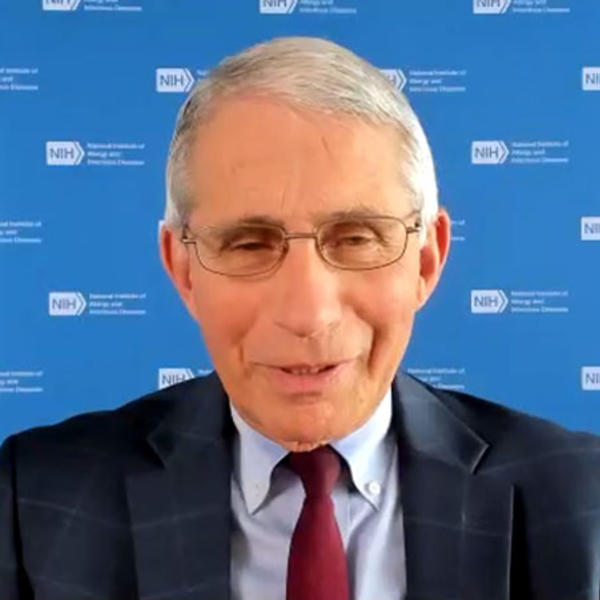Dr. Anthony Fauci '62, the nation's most trusted expert leading the COVID-19 response, joined current Holy Cross students in a live webinar on October 6 to discuss the trajectory of the coronavirus pandemic and the best ways students can keep themselves and their communities safe.
Dr. Fauci took questions from a dozen students during the Q&A session, sponsored by the Rev. Michael C. MacFarland, S.J. Center for Religion, Ethics and Culture, on topics ranging from virus mutations to development of a vaccine to global cooperation during the pandemic.
"Pandemics are global," Dr. Fauci noted in response to a question on international cooperation from Zicong Li '21, a philosophy major. "There's no such thing as a provincial pandemic. For those of us who have spent years studying Latin and Greek—I always pull out my Holy Cross card on people when I talk—‘pan’ means all. It's a pandemic throughout the world, and countries need to cooperate."
He reflected on the disparate rate at which COVID-19 is affecting people of color. "I think that this outbreak has shed a bright, painful light for me on something that I have known for years, particularly from the early years of HIV, and that is the somewhat shameful disparities in health among our minority population—brown and black people," he said. "We've got to do something in society to get rid of that enormous disparity. The problem with that is it takes decades. You have to have a societal commitment that you're going to change that around."
Prompted by a question by Alfonso del Aguila '21, a psychology major, Fauci also spoke on the most difficult decision he has had to make in his career, in a reference to his current role as a leading member of the coronavirus task force.
"When it became clear that we had community spread in the country… I recommended to the President that we shut the country down. That was a very difficult decision, because I knew it would have serious economic consequences, which it did,” Fauci said.
“But there was no way to stop the explosive spread that we knew would occur if we didn’t do that. And unfortunately, since we actually did not shut down completely—the way China did, the way Korea did, the way Taiwan did—we actually did see spread even though we shut down."
Fauci believes he has continued to find success in his role, including times he has had to speak truth to power, by ensuring all his recommendations are based on science and not being afraid to tell people what they might not like to hear.
"You should never, ever veer away from being transparent, being consistent, and being truthful," Fauci said. That includes being honest about what you don't know. “I wake up every morning and I worry about the things that I don’t know… that's what drives a good scientist and a good policy person.”
Fauci also had a word of advice for students, as he touched upon the high numbers of transmission currently among young people. "You have a moral obligation to wear a mask," he noted. "You have a societal responsibility to protect yourself as well as the people around you."
Fauci also said that he is "cautiously optimistic" that there will be a viable vaccine, likely by the end of the year. "The thing that we've got to make sure we appreciate is that this is going to end. One of the things we have to be careful about is despair," he said. "We're going to get a vaccine, we’re going to get it in a reasonable amount of time. Don't give up hope."
Fauci credits his passion for service to his upbringing and his Jesuit and liberal arts education, including an unusual premed course of study at Holy Cross that combined medicine with the study of ancient Greek. “I always felt that I was more interested in human nature than I was in human psychology. That really started from the time I was a child… I wasn't quite sure what it meant until it became really explicit with a Jesuit education, both at Regis [High School] and at Holy Cross."
A classics major with a premedical concentration (now health professions advising) at Holy Cross, Dr. Fauci has often credited his professional success to the Jesuit intellectual rigor that was a core part of his education at the College, which also instilled in him a lifelong commitment to social justice.
A top-cited scholar, Presidential Medal of Freedom recipient and Holy Cross alumnus, Dr. Fauci is director of the National Institute of Allergy and Infectious Diseases at the National Institutes of Health and a member of the White House Coronavirus Task Force. He has received over 45 honorary doctoral degrees, including one from Holy Cross, and was recently recognized as the Federal Employee of the Year.
Access the complete recording of the live webinar with Dr. Fauci &feature=youtu.be">here.
Dr. Anthony Fauci '62 Talks to Holy Cross Students About the Pandemic: ‘Don't Give Up Hope’

In a live webinar, the Classics major answered questions from students on COVID-19
Read Time
4 Minutes


